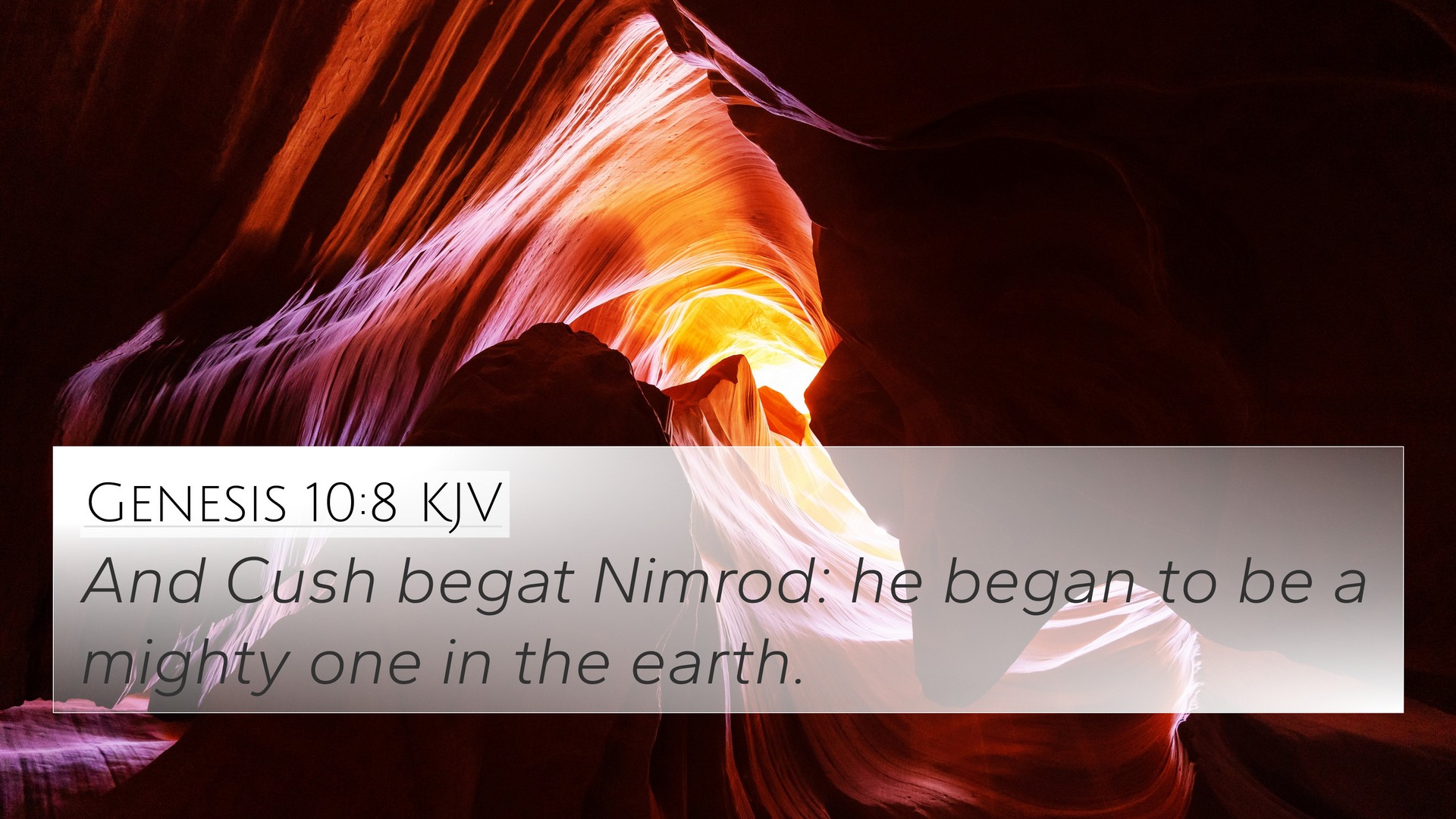Understanding Genesis 10:8
Verse: Genesis 10:8 - "And Cush begat Nimrod: he began to be a mighty one in the earth."
This verse introduces Nimrod, a significant figure in Biblical history, known as a mighty warrior and leader. To grasp the meaning of this verse fully, we can derive insights from renowned public domain commentaries, including those by Matthew Henry, Albert Barnes, and Adam Clarke. Each of these commentaries provides a unique perspective on the life and impact of Nimrod, rooted in historical and theological context.
Commentary Insights
Matthew Henry's Commentary
Matthew Henry emphasizes the legacy of Nimrod as a king and a hunter, suggesting he embodies rebellion against God. His name, related to the Hebrew ‘mighty,’ implies both physical strength and moral depravity. Nimrod’s establishment of a kingdom and his endeavors symbolize humanity's self-reliance and ambition, often seen as texts illustrating the folly of pride.
Albert Barnes' Notes
Albert Barnes notes that Nimrod is depicted as a "mighty one" which aligns with the strong opposition to divine command. He elaborates on Nimrod’s lineage from Cush and how this connection signifies the initial spread of idolatry and self-worship. Barnes connects Nimrod’s narrative with the post-Flood world, highlighting the desire for power and prestige among humanity.
Adam Clarke’s Commentary
Adam Clarke places Nimrod in a broader historical context, describing him as a conqueror and a builder of cities. He highlights the significant dialectical movement within Scripture, where Nimrod can be viewed as both a leader of innovation and a pioneer of moral corruption. Clarke interprets his story as a warning against the misuse of God-given gifts for selfish purposes.
Cross-References
Genesis 10:8 has numerous connections throughout the Bible, providing a broader understanding of its themes. Here are some related verses that enhance our comprehension:
- Genesis 6:4: Discusses the "mighty men" of old, paralleling Nimrod's status.
- Genesis 11:1-9: The story of the Tower of Babel reflects human ambition and unity against divine will, connecting to Nimrod's endeavors.
- 1 Chronicles 1:10: Reiterates Nimrod’s role as a mighty man and leader.
- Micah 5:6: Mentions Assyria, hinting at the nations arising from Nimrod’s legacy.
- Luke 3:35-36: Provides a genealogical link from Cush to Nimrod, emphasizing historical continuity.
- Acts 2:9: Referencing nations descended from Noah's sons, illustrating Nimrod's influence in the Eastern regions.
- Revelation 11:8: Refers to Sodom and Egypt, connecting to the ideas of rebellion manifested in Nimrod's life.
Theological Implications
The figure of Nimrod is not merely historical but serves as a symbolic representation of human ambition and the pitfalls of power apart from divine oversight. His legacy opens avenues for understanding themes of:
- Pride and Rebellion: Nimrod represents those who challenge God's authority.
- Unity in Rebellion: His kingdom signifies the collective human effort against God's will.
- Moral Corruption: The rise of cities and strength often correlates with a decline in spiritual integrity.
Connecting Themes through Cross-References
By employing scriptural cross-referencing, one can uncover deeper insights about Nimrod’s character and the surrounding narratives. The connections mentioned above illustrate how individuals and groups throughout the Bible often mirrored Nimrod's journey of pride and rebellion. Through comprehensive Bible cross-reference materials, the task of understanding such themes becomes more accessible.
Tools for Bible Cross-Referencing
For those interested in exploring these connections further, utilizing tools like a Bible concordance or a Bible cross-reference guide can greatly enhance one’s study. Understanding how these themes are woven throughout Scripture introduces a richer dialogue not only within the Old Testament but extends into the New Testament, showcasing the unity and consistency of Biblical teaching.
Conclusion
Genesis 10:8 serves as a pivotal point for examining the nature of humanity in relation to divine authority. By analyzing this verse through various public domain commentaries and correlating it with other scripture references, readers can gain profound insights into the Biblical narrative connected to human ambition and divine purpose.



